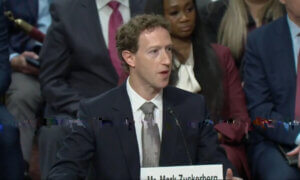Jack Dorsey is on a voyage. Let’s begin with that.
It has been well over a year since he embarked on a journey to fix a Twitter which he sees as broken; he has calmly but firmly admitted in a series of tweets back in 2018 that the company did not “fully predict or understand the real-world negative consequences” the social media platform would present to the users in the years that followed.
“We aren’t proud of how people have taken advantage of our service, or our inability to address it fast enough,” Dorsey went on to say back then, partially taking the blame.
Not much seems to have changed since he made his decision – at least not much that we can see ourselves, that is. After all, Jack Dorsey can be compared to a mountain: in the face of adversity, he has always stayed frighteningly (and perhaps annoyingly, to some) calm.
In his resolve to fix something much bigger than himself, he has remained as stoic as ever and Dorsey took to the stage of TED 2019 this week to talk to the world about it.
He reiterated that his worries have stayed the same and that he wants to solve Twitter’s problems, problems he never anticipated happening, 13 years ago.
“Our purpose is to serve the public conversation, and we have seen a number of attacks on it. We’ve seen abuse, we’ve seen harassment, we’ve seen manipulation, automatic and human coordination, misinformation” he said “What worries me most is our ability to address it in a systemic way that is scalable.”
So, the question stands: how can anyone control, in any way, what millions of users are doing and how can a social media platform create and maintain a safe space for the people who need it? When asked, Dorsey admitted that a solid portion of abuse and harassment is directed towards people of color, black women specifically.
According to a crowdsourced study by Amnesty, a problematic or abusive tweet is sent out to a woman every 30 seconds. Women of color on the other hand, have to deal with one abusive tweet every 10 tweets.
“It’s a pretty terrible situation when you’re coming to a service where, ideally, you want to learn something about the world, and you spend a majority of your time reporting abuse, receiving harassment,” he said “Last year, we decided that we’re going to apply a lot more machine learning, a lot more deep learning to the problem, and try to be a lot more proactive, so we can take the burden off the victim completely.”
He went on to explain that his team has and is making efforts into taking down and banning hateful accounts, such as Nazi group accounts. However, he continued by stating that particular term is ‘used fairy loosely’ and that they cannot “take any one mention of that word accusing someone else as a factual indication that they should be removed from the platform.”
Yes, in theory, it should be easy to put down the bad guys, but, at the same time, Dorsey has always been adamant that Twitter’s defining value is free speech.
That in itself, as we all know, is a terrain littered with landmines, which should be navigated delicately.
Quickness will not get the job done; it’s focus, it’s prioritization; it’s understanding the fundamentals of the network
Carole Cadwalladr, the British journalist who revealed Cambridge Analytica’s role in the Brexit vote stood on the same stage Dorsey was on just a day before and, though we don’t know if she had any idea that he would be seated in the same spot only a day later, she addressed a question to him and the other ‘gods of Silicon Valley’, as she called them.
“This technology that you have invented has been amazing, but now it’s a crime scene,” Cadwalladr calmly said. “My question to you is, is this what you want? Is this how you want history to remember you? As the handmaidens to authoritarianism all across the world? You set out to connect people and the same technology is now driving us apart.”
Dorsey spoke on stage later on as if in response to Cadwalladr’s question and admitted that he would rebuild Twitter differently, if he had the chance to start again.
Dorsey said that, if he could start from scratch, he wouldn’t have placed such an emphasis on either the follower count or the ‘like’ button, stating that those two features do not represent what Twitter now believes “to be the most important thing, which is healthy contribution back to the network.”
If it was up to Dorsey to make the unanimous choice, he would much prefer it if Twitter would be all about people prioritizing learning rather than spreading hate, being outraged or on the flip side, getting harassed.
About 38% of the abusive tweets are flagged by algorithms but it’s still the humans who have to review what has been flagged, before the Tweets can be taken down. That was Dorsey’s good news so far: that the 38% represents a huge leap from the 0% it was just a year ago.
It’s true, but 38% is not, say, at least 50%. Does that number even make a dent in hate speech?
Dorsey evaded an exact response when asked how many people are actually working on content moderation across the platform.
“It varies,” Dorsey stated “We want to be flexible on this. There are no amount of people that can actually scale this, which is why we have done so much work on proactively taking down abuse.”
In addition to putting more human work behind the algorithms, Dorsey is slowly trying to change the company from the inside as well, choosing to focus on diversity and on actual representation: “We can’t build a business that’s successful unless we have a diversity of perspective inside our walls that actually feel these issues every single day.”
However, these small band aids, these small steps, will not fix a shattered platform overnight. I believe Dorsey is well-aware of that too but I am not sure how many people can or will actually fall in line with his idea of a new Twitter that should, theoretically, be capable of delivering ‘something that people value’.
We can’t build a business that’s successful unless we have a diversity of perspective inside our walls
The fact still remains a large number of people are attracted to social media platforms simply because they have the option of pitching in with nothing but more flammable content.
Jack Dorsey is not a god, though Carole Cadwalladr listed him as one, but he appears set on making a change. After one change, he will make another, in what looks from where we stand, a relentless tug of war.
He remained determined during his TED talk: “We could do a bunch of superficial things, but we need the changes to last.” Dorsey continued stating that means “questioning how the system works and how the framework works and what is needed for the world today, given how quickly everything is moving … Quickness will not get the job done; it’s focus, it’s prioritization; it’s understanding the fundamentals of the network and building a framework that scales and that is resilient to change — and being open about where we are so we can continue to earn trust.”
Follow TechTheLead on Google News to get the news first.






